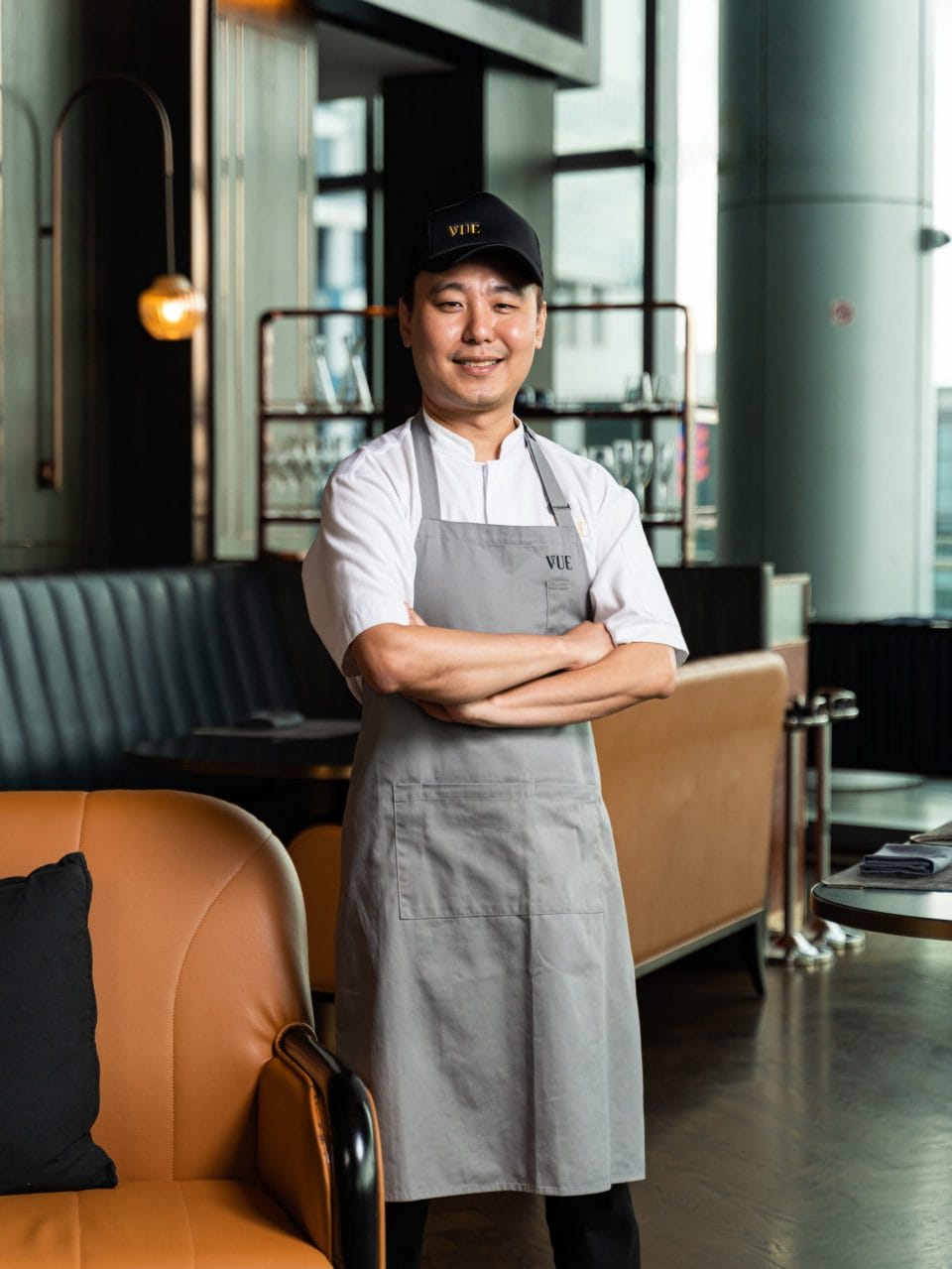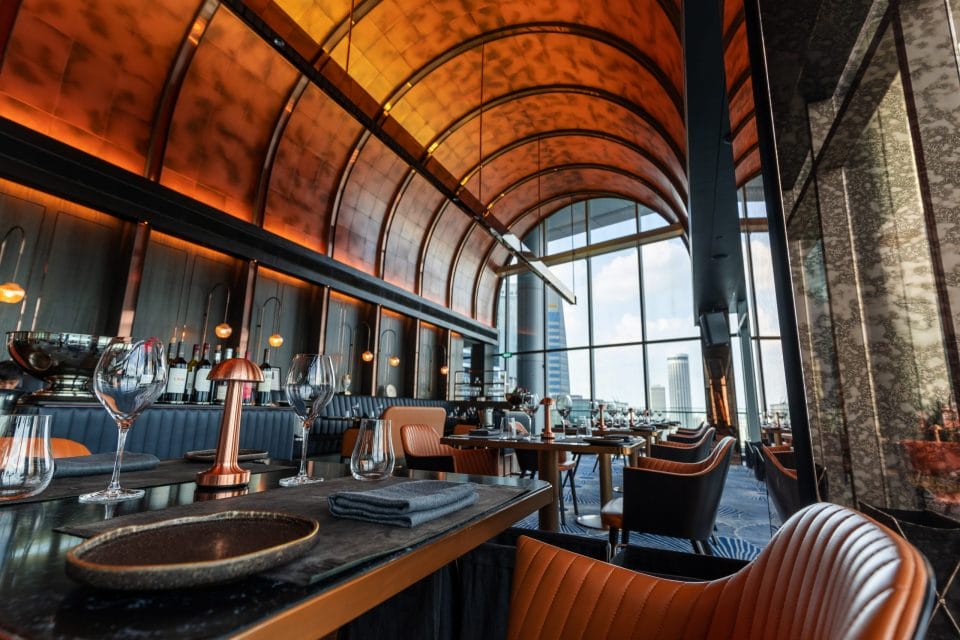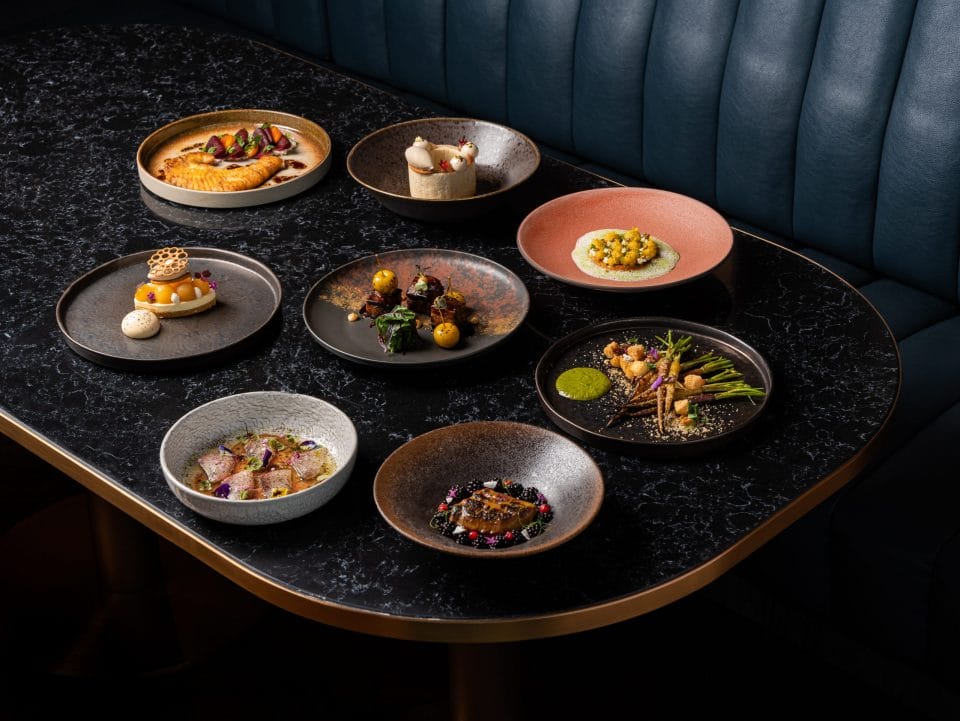
Executive Chef Sam Chin of VUE has an innate flair for bringing ingredients to life but beyond the hype and the heart, his myriad of memories from a childhood in Penang to working in elite kitchens, it makes him the dining scene’s next power player.
Chef Sam Chin is personable, making you rethink the tropes and tempers associated with his profession. Bearing in mind that whatever we used to think of them, volatile and impenetrable, or currently imagine them to be in a modern context, charming and camera-ready. Chin is, for lack of a better word, nice.
It must be said that being genial to his staff and his team members at VUE is not a carefully cultivated persona. It is part nature and part nurture. Chin’s even-tempered personality shines through the most when diners are finicky or overbearing (Chin is a deft hand at executing dishes à la minute). His decade-long experience in the culinary industry taught him that good behaviour fosters a productive environment.
“I am open-minded and democratic. As long as my team members do their jobs and meet their KPIs, I don’t micromanage. The kitchen is a tense and stressful enough environment as it is. Being friends rather than their manager allows us to work more effectively together.”
 Where is the line drawn between Chin and his team? The Deputy who dishes out the commands for efficiency, the Commis who cuts and washes, or the Chef de partie who does the presentation? Chin’s standards are simple: two heads can make a menu, but three or four in perfect harmony is a fertile ground for ideas to blossom. The chef is no longer the kitchen’s star but instead stands on the shoulders of the people who work with him.
Where is the line drawn between Chin and his team? The Deputy who dishes out the commands for efficiency, the Commis who cuts and washes, or the Chef de partie who does the presentation? Chin’s standards are simple: two heads can make a menu, but three or four in perfect harmony is a fertile ground for ideas to blossom. The chef is no longer the kitchen’s star but instead stands on the shoulders of the people who work with him.
“Everyone has different ideas that can come together and contribute to an end result far more colourful and creative than anything I can come up with alone. However, good food is simple and straightforward. In its simplicity, good food tastes good and evokes good feelings when you eat it. Ingredients are key to me. Seasonality, sustainability and how my choices give back to the people and places that grow my food.”
“I’ve always loved to eat. Food shaped a lot of my childhood. I love visiting the markets when I travel because that’s where the locals get their food. It was my father who encouraged me to be a chef,” says Chin as a succinct credo to sum up the work he has done at VUE — a smorgasbord of food that brings people together. The theatrics of its experience (dine using Robert Welch utensils, eat off Case Alegre Portugal plates and wipe off with Orchid-Teneya serviettes) and an aspirational story to be one of dining’s biggest players means playing a fair game itself.
“As a chef, you are a man in uniform, and people acknowledged and recognised that prestige in Europe. Knowing I can be someone by doing something I love – preparing food – made me want to be a chef. The chance to work with food and see what magic we can create that day with it drives me every day as a chef.” This art of “restaurateuring” — perfect, pleasant, and hopefully, packing a restaurant till the guest list reduces its font size down several notches — is what one would consider Chin as a modern chef of today
He is a thinker who knows the right ideas to make things sizzle (“I don’t need overly complicated techniques, stuffy execution and presentations”), a talker (perhaps, the most exciting experience at VUE is when Chin himself visits one’s table), and an artist on one hand, and a chef on the other who stands up to the scrutiny of Singaporeans whose tastes have expanded to an amount of SGD$43 billion in the first quarter of the year.
For all of Chin’s successes — rising to Chef de Cuisine at Triple Three in a short period, clinching gold in the inaugural Dubai World Hospitality Championship 2013, and being named as one of Singapore’s hottest hotel chefs under 40 by Singapore Business Review — comes a surprising lack of stillness or paradoxes that comes with quick success, a flash in the pan that burns out as quickly as it is lit.
It can be said that Chin operates in the same way as the young chef he was when he first started at Top of the M in 2005 (part of his charisma is his never-ending curiosity) but instead, as a chef would say, dying on the pass, conceptual simplicity in a dining context is born out of confidence and control.
“After some years of working, I realised I wanted to keep things simple. I’m very drawn to the Scandinavian style of cooking; they focus on the produce and keeping techniques simple. My style focuses more on preparing them to be the best they can be. I don’t need overly complicated techniques, stuffy execution and presentations. I rather focus on quality and rely on creativity to bring out the best in something. I want to tell a story with my food.”
“I respect it by using ingredients at their prime in that year and focusing on bringing out the essence of each ingredient and preparing them to be the best they can be. Fresh ingredients are always the key to good food, and it should be prepared to bring out the best flavours.”
 Simplicity is never as exciting as complicated, but it is a necessary part of the dining experience as we now realise that the act should be democratic, especially at VUE, where industry insiders grandiosely coin it the “The Cathedral” with its Gotham-like architecture. We like a bang for our buck and are here to be entertained.
Simplicity is never as exciting as complicated, but it is a necessary part of the dining experience as we now realise that the act should be democratic, especially at VUE, where industry insiders grandiosely coin it the “The Cathedral” with its Gotham-like architecture. We like a bang for our buck and are here to be entertained.
We, too, have a growing conscience about the provenance of the produce and provision we eat. Chin’s point of view is equally straightforward: the concept of sustainability starts with whatever the team can do within their own means. The green mile begins with one single step forward.
“Due to the COVID-19 pandemic, my team and I were challenged with an oversupply of ingredients. As a result, we learnt to age and preserve them to help them last, which brought out flavours I never knew in ingredients I’ve always worked with. My team and I did a lot of research and development on this to find the best ingredients to dry age and more. Resultantly, our kitchen has a lot of specially preserved, cured and dry-aged products that diners won’t find anywhere else
“While we are not a fully sustainable-certified restaurant at the moment, we try to be more conscientious. We ensure we know the origins of our ingredients and make an effort to use farmed produce with MSC labels when possible. We prefer farmed produce because there is consistency in supply, which helps reduce wastage from trimmings. I try to use every part of the ingredient when I cook. I make cocktail syrups, jams and compotes from fruit scraps, we prepare staff meals from the trimmings of meat proteins, and most shellfish or seafood trimmings go into making our soups and sauces.”
“I also remind myself to be grateful every day. I am grateful that I am living my dream of being able to craft my own menu for a restaurant and decide what I want to serve. Be grateful for everything that you have now, so you open up space for what is to come,” says Chin, who, in the culinary world where the proverbial knife is Wüsthof sharp, proves that nice guys finish first.
Once you’re done with this story, click here to catch up with our September 2022 issue!







